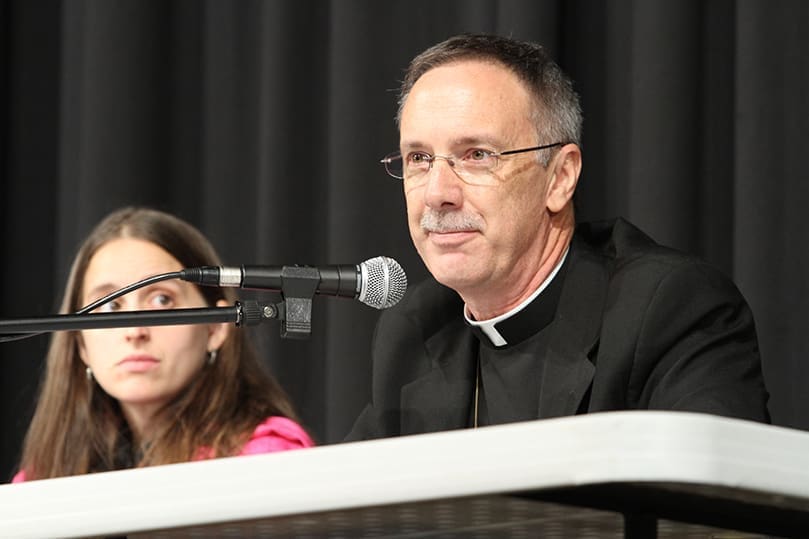 Photo By Michael Alexander
Photo By Michael AlexanderDecatur
Panel Considers Immigrants Through Gospel Lens
By ANDREW NELSON, Staff Writer | Published October 27, 2011
Auxiliary Bishop Luis R. Zarama joined an ecumenical panel of Christian leaders Oct. 11 to bring a faith perspective to the debate surrounding immigration reform.
Laws passed in Georgia and other states are affecting the dignity of the human person and destroying families, said Bishop Zarama.
Georgia and Alabama recently implemented laws that crack down on undocumented workers. A recent report from the University of Georgia found the state’s economy is on pace to lose $391 million because of labor shortages to harvest crops. Critics say the law scares the undocumented workers away from needed jobs.
Smoke Rise Baptist Church, Decatur, hosted the viewing of a new documentary “Gospel Without Borders” that asks Christians to examine their beliefs and challenges what it says are misperceptions about immigration. It is the latest production from EthicsDaily.com, a nonprofit organization and part of the Baptist Center for Ethics that provides ethics resources to Christians across denominational lines. More than 50 people attended the panel and watched the documentary.
Panelists urged churches and their leaders to be more outspoken by challenging politicians and their supporters who spread misinformation. They also talked about rallying church members to take up the cause of the undocumented.
The other panelists were Timothy McDonald, senior pastor of the First Iconium Baptist Church, Atlanta; Mimi Walker, co-pastor of Druid Hills Baptist Church, Atlanta; and Lesley Ediger, program manager, Refugee Resettlement and Immigration Services of Atlanta.
“We talk to each other, but we don’t talk to the people enough,” said McDonald.
History shows people must fight and struggle for rights others take for granted, he said.
“It wasn’t until a group of people said enough is enough,” he said, noting how women had to protest for the right to vote and the civil rights movement had to challenge segregation laws before they were changed.
Walker said conversations need to be had that help people understand details about immigration reform. “We are not calling for lawlessness. We are calling for law that reflects God’s law,” she said.
Bishop Zarama said he sees the undocumented immigrants not as strangers but people who worship in the same church in a different country.
“Our big challenge is how we help our communities to be concerned about this issue, which affects the dignity of the human person,” he said. “These immigration laws that we have here in Georgia and other states in the United States are affecting the dignity of the human person and affecting the structure of the family and destroying families.”
Undocumented immigrants have been here for years, providing cheap labor and now people are making them scapegoats in a poor economy, said Bishop Zarama.
“We used them. Now we are using these people again to blame them for what is wrong in the (United) States,” he said. “They cannot defend themselves.”
Ediger said undocumented immigrants fear getting a knock on their door at all hours of the day and night. Many people end up at the Stewart Detention Center outside Lumpkin, with its 1,752 beds. In the medium security prison, they face imprisonment behind barbed wire where they get an hour of sunlight every day, she said.
“Gospel Without Borders” highlights stories in five states, including that of two Presbyterian pastors in Arizona working on the border; of a Catholic bishop in Arkansas, where close to half the faith community is Hispanic; and of a church in Iowa, where a young Hispanic community breathes life into an aging church and restores the sanctuary.
Robert Parham, executive editor of EthicsDaily.com, said the goal of the documentary is to be a resource to the entire Christian community.
“We may not all share the same understanding of baptism, but we all have a common commitment to advancing the common good for undocumented immigrants in our society,” he said.
The goal is to raise awareness about “what the biblical witness says to the Christian community about our moral obligation to care for the undocumented in our society,” he said.
For more information about the film, visit www.ethicsdaily.com.